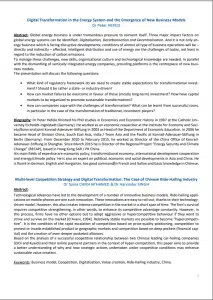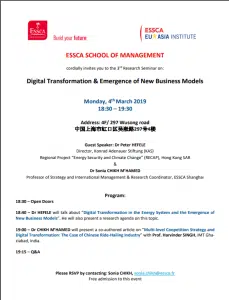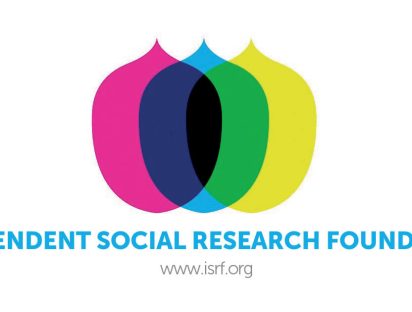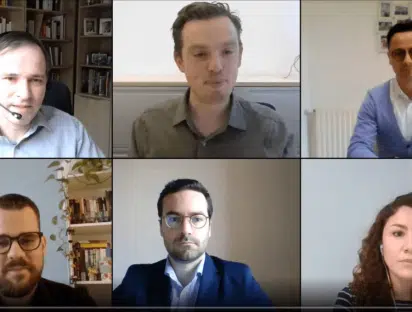4 March 2019 – Research Seminar – ESSCA Shanghai
ESSCA SCHOOL OF MANAGEMENT invited to the
3rd Research Seminar on: Digital Transformation & Emergence of New Business Models
Monday, 4th March 2019, 18:30 – 19:30, Address: 4F/ 297 Wusong road
Guest Speaker
Dr Peter HEFELE Director, Konrad Adenauer Stiftung (KAS) Regional Project “Energy Security and Climate Change” (RECAP), Hong Kong SAR
& Dr Sonia CHIKH M’HAMED, Professor of Strategy and International Management & Research Coordinator, ESSCA Shanghai
Download the full programme
Programme:
18:30 – Open Doors
18:40 – Dr HEFELE will talk about “Digital Transformation in the Energy System and the Emergence of New Business Models”. He will also present a research agenda on this topic.
19:00 – Dr CHIKH M’HAMED will present a co-authored article on “Multi-level Coopetition Strategy and Digital Transformation: The Case of Chinese Ride-Hailing Industry” with Prof. Harvinder SINGH, IMT Ghaziabad, India.
19:15 – Q&A
Free admission to this event
Digital Transformation in the Energy System and the Emergence of New Business Models
Dr Peter HEFELE
Abstract: Global energy business is under tremendous pressure to reinvent itself. Three major impact factors on
global energy systems can be identified: Digitalisation, Decarbonisation and Decentralisation. And it is not only energy business which is facing disruptive developments; conditions of almost all type of business operations will be –
directly and indirectly – affected. Intelligent distribution and use of energy are the challenges of today, not least in
regard to the reduction of carbon emissions.
To manage these challenges, new skills, organisational culture and technological knowledge are needed. In parallel
with the dismantling of vertically integrated energy companies, providing platforms is the centrepiece of new business models.
The presentation will discuss the following questions:
• What kind of regulatory framework do we need to create stable expectations for transformational investment? Should it be rather a state- or industry-driven?
• How can market failures be overcome in favour of those (mostly long-term) investment? How have capital
markets to be organized to promote sustainable transformations?
• How can companies cope with the challenges of transformation? What can be learnt from successful cases,
in particular in the case of the transformation of traditional, incumbent players?
Biography: Dr Peter Hefele finished his PhD studies in Economics and Economic History in 1997 at the Catholic University Eichstätt-Ingolstadt (Germany). He worked as an economic researcher at the Institute for Economy and Society/Bonn and joint Konrad-Adenauer-Stiftung in 2003 as Head of the Department of Economic Education. In 2006 he became Head of Division China, South East Asia, India / Team Asia and the Pacific at Konrad-Adenauer-Stiftung in Berlin (Germany). From December 2010 to February 2015, he worked as Director of the China Office of KonradAdenauer-Stiftung in Shanghai. Since March 2015 he is Director of the Regional Project “Energy Security and Climate Change” (RECAP), based in Hong Kong SAR / PR China.
His main fields of expertise are economic policy, transformational economy, international development cooperation and energy/climate policy. He is also an expert on political, economic and social developments in Asia and China. He is fluent in German, English and Hungarian, has good command in French and Italian and basic knowledge in Chinese.
Multi-level Coopetition Strategy and Digital Transformation: The Case of Chinese Ride-Hailing Industry
Dr Sonia CHIKH M’HAMED & Dr Harvinder SINGH
Abstract:
Technological advances have led to the development of a number of innovative business models. Ride-hailing applications on mobile phones are one such innovation. These innovations are easy to roll-out, thanks to their technologydriven model. However, this also creates intense competition in the market in a shortspan of time. The firm’s survival requires competitive strengthening, in other words, to enhance its competitive advantage constantly. However, in this process, firms have no other options but to adopt aggressive or hypercompetitive behaviour if they want to strive and survive on the market (D’Aveni, 1994). Relatively stable markets are possible to become “hypercompetitive”. It is the condition of the rapid escalation of competition based on price-quality positioning, competition to protect or invade established product or geographic markets and competition based on deep pockets (financial capital) and the creation of even deeper pocketed alliances. Based on the analysis of a successful coopetitive relationship between two Chinese leading car-hailing companies (DiDi and Kuaidi) and their online payment partners in the context of hyper-competition, this paper aims to provide a better understanding of why and how strategic actions undertaken under coopetitive conditions may enhance sustainable value creation.
Keywords: Business model, Coopetition, Digitalisation, Value creation, Ride-hailing industry, China.
[cite]








